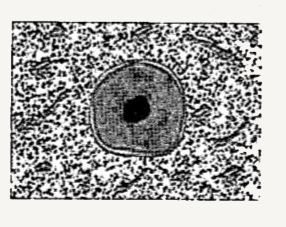Which type of cell lacks membrane-bound organelles?
To answer the question "Which type of cell lacks membrane-bound organelles?", we can follow these steps:
1. Understand Cell Types: There are two main types of cells: prokaryotic and eukaryotic. It is important to differentiate between them.
2. Identify Characteristics:
- Prokaryotic Cells: These cells do not have a nucleus or membrane-bound organelles. Their genetic material is located in a region called the nucleoid, which is not enclosed by a membrane.
- Eukaryotic Cells: These cells have a defined nucleus and membrane-bound organelles, such as mitochondria, Golgi apparatus, and endoplasmic reticulum.
3. Membrane-Bound Organelles:
- In eukaryotic cells, organelles are surrounded by membranes, which compartmentalize various cellular functions.
- In prokaryotic cells, organelles are not membrane-bound. For example, ribosomes are present in both cell types but are not surrounded by membranes.
4. Conclusion: Since prokaryotic cells lack membrane-bound organelles, the answer to the question is that prokaryotic cells are the type of cells that lack membrane-bound organelles.
Final Answer:
Prokaryotic cells lack membrane-bound organelles.
---
- Prokaryotic Cells: These cells do not have a nucleus or membrane-bound organelles. Their genetic material is located in a region called the nucleoid, which is not enclosed by a membrane.
- Eukaryotic Cells: These cells have a defined nucleus and membrane-bound organelles, such as mitochondria, Golgi apparatus, and endoplasmic reticulum.
- In eukaryotic cells, organelles are surrounded by membranes, which compartmentalize various cellular functions.
- In prokaryotic cells, organelles are not membrane-bound. For example, ribosomes are present in both cell types but are not surrounded by membranes.
Prokaryotic cells lack membrane-bound organelles.
Topper's Solved these Questions
- BOOK - MODERN PUBLICATIONCHAPTER - CELL : THE UNIT OF LIFE EXERCISE - NCERT FILE (NCERT EXERCISE QUESTIONS)14videos
CELL : THE UNIT OF LIFE
- BOOK - MODERN PUBLICATIONCHAPTER - CELL : THE UNIT OF LIFE EXERCISE - NCERT FILE (NCERT EXEMPLAR PROBLEM (A. MULTIPLE CHOICE QUESTIONS))14videos
CELL : THE UNIT OF LIFE
- BOOK - MODERN PUBLICATIONCHAPTER - BREATHING AND EXCHANGE OF GASESEXERCISE - CHAPTER PRACTICE TEST14videos
BREATHING AND EXCHANGE OF GASES
- BOOK - MODERN PUBLICATIONCHAPTER - CELL CYCLE AND CELL DIVISIONEXERCISE - CHAPTER PRACTICR TEST (SECTION-D)(LONG ANSWER TYPE QUESTION)1videos
CELL CYCLE AND CELL DIVISION
Similar Questions
The nucleus of a cell is a membrane-bound organelle that contains the genetic material i.e., DN(A) The cellular material present outside the nucleus is called cytoplasm.

Which membrane separates the components of nucleus and cytoplasm?View SolutionMembrane-bound organelles are absent in :
View Solution
Knowledge Check
- Question 1 - Select One
Single membrane bound organelle is
ALysosomeBPlastidCNucleusDMitochondria - Question 2 - Select One
Single membrane bound organelles are
ALysosomeBSphaerosomeCGlyoxysomeDAll of these - Question 3 - Select One
Assertion : The cells that have membrane bound organelles are called eukaryotic.
Reason : The cells that lack membrane bound organelles are called prokaryotic.AIf both assertion and reason are true amnd reason is the correct explanation of assertion.BIf both assertion and reason are true but reason is not the correct explanation of assertion.CIf assertion is true but reason is false.DIf both assertion and reason are false.
Membrane bound organelles are absent in
View SolutionMembrane bound organelles are absent in
View SolutionA Eukaryotic cell has membrane bound organelles, including a nucleus, which allow cellular processes to be carried out in .........
View SolutionAssertion : Kingdom -Monera is also known as kingdom- Prokaryota.
Reason : Monera cells lack membrane bound cell organellus.View SolutionWhich of these statements is/are true ?
(i) The surface area avaiable for cellular function in a prokaryotic cell is less than that in a eukaryotic cell.
(ii) The total genome size of a prokayotic cell is always less than that of a eukaryotic cell.
(iii) Unlike eukaryotes, no special respiratory respiratory organelles are found in prokaryotes. Hence they respire at a much lesser rate than eukaryotes.
(iv) Eukaryotic cells show various membrane bound organelles such as chloroplasts and nucles while ribosomes are the only membrane bound organelles found is prokaryotes.View Solution
